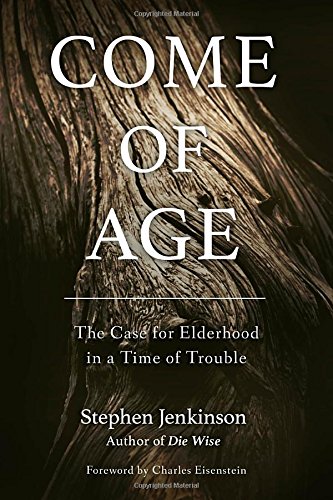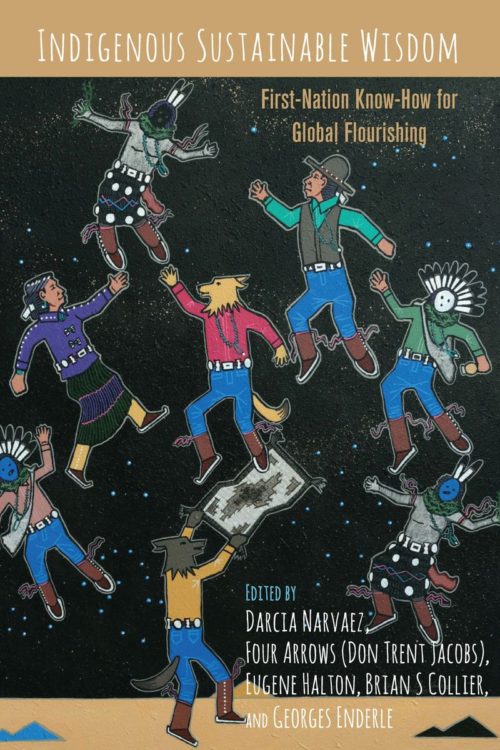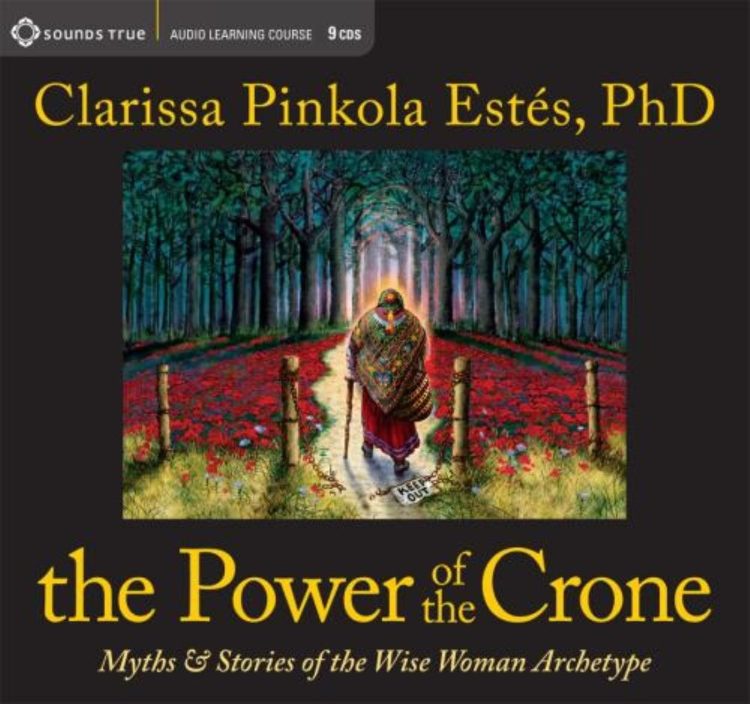Self-Actualize And Become A Wise Elder
PART THREE OF FOUR: The practices that foster your elderhood development
As mentioned in the prior blog post in the series, in his book, Come of Age: The Case for Elderhood in a Time of Trouble, Stephen Jenkinson pointed out the increased number of old people alongside the decreased number of “elders.” People are aging but not becoming wise. Jenkinson calls on those who are aging to take up elderhood. How do we do that?
 It turns out that growing into elderhood is like becoming a self-actualizer. Wise elders act like self-actualized people. According to Abraham Maslow, a founder of humanistic/positive psychology, self-actualization is everyone’s overall aim. He says: “The more we learn about man’s natural tendencies, the easier it will be to tell him how to be good, how to be happy, how to be fruitful, how to respect himself, how to love, how to fulfill his highest potentialities. This amounts to automatic solution of many of the personalityproblems of the future. The thing to do seems to be to find out what you are really like inside, deep down, as a member of the human species and as a particular individual.” (Maslow, 1962, p. 4).
It turns out that growing into elderhood is like becoming a self-actualizer. Wise elders act like self-actualized people. According to Abraham Maslow, a founder of humanistic/positive psychology, self-actualization is everyone’s overall aim. He says: “The more we learn about man’s natural tendencies, the easier it will be to tell him how to be good, how to be happy, how to be fruitful, how to respect himself, how to love, how to fulfill his highest potentialities. This amounts to automatic solution of many of the personalityproblems of the future. The thing to do seems to be to find out what you are really like inside, deep down, as a member of the human species and as a particular individual.” (Maslow, 1962, p. 4).
Maslow suggested practices that can help lead us toward self-actualization. These practices come more easily to those past middle adulthood when being unique (instead of conformist) seems necessary
Briefly, self-actualization practices include:
- Experience life fully (emotionally, psychically, physically).
- All day long, choose openness rather than defensiveness.
- Know yourself by listening to your body/psyche’s preferences/reactions/intuitions.
- Be honest about your true self and take responsibility for your feelings and actions.
- Listen to your inner self and dare to follow your unique path.
- Keep practicing self-actualization—it is a process.
- Find ways to have more peak experiences (oceanic feelings of oneness with the universe).
- Address your psychopathologies.
Maslow pointed to self-actualization as an essential part of human nature, an inner core that is biologically based and intrinsic, unless frustrated or discouraged by sick cultures.
Self-actualizers are rare in our societies today because of what Maslow called neuroticisms caused by “sick” cultures:
- The desire to dominate others or to submit to them—indications of a self-protective disposition (a brain that downshifts easily to survival modes)
and:
- The desire to inflict pain (sadism)—an indication of deep trauma.
Maslow and psychoanalysts of his time thought that the illnesses of neuroticism and self-despise resided in the unconscious, in interaction with culture:
“Sick people are made by a sick culture; healthy people are made possible by a healthy culture. But it just as true that sick individuals make their culture sicker and that healthy individuals make their culture more healthy.” (Maslow, 1962, p. 5
The “sickness” starts in early life.
As I point out elsewhere (Narvaez, 2018), Maslow’s hierarchy of needs (physiological, safety, love, esteem, self-actualizing) is actually not sequential but needs to be concurrent in early childhood for proper child development. That is, a baby is oriented to self-actualizing, but needs caregivers to provide the security, love, esteem, etc., for proper neurobiological development and setting a trajectory for optimal fulfillment. We can observe the effects of the evolved nest, which meets basic needs, on optimal normal development.

Clarissa Pinkola Estes (The Power of the Crone, CD #4, track 4), describes the planting of young trees in a public park. Those who planted the trees were ignorant about how to plant trees with roots encased in wire baskets. Instead of removing the basket cages used for safe transport, they planted them with the basket cages intact. Although the young trees seemed to grow well initially, when a storm with fierce winds came up some many months later, the trees had no widespread, flexible base to allow them to bend—their roots were largely still trapped within the wires—and so their trunks all snapped at the base near the ground.
Too many of us have been “planted” this way—the wrong way—by a culture sick with the fever of exploitation (Wetiko), passed from person to person, parent to child, neighbor to neighbor. We’ve been toxically stressed in early life, so much so that we get easily anxious or angry (because the development of the stress response and other systems was undermined by culturally-based baby undercare—the missing evolved nest; see Thriving or Just Surviving? Are your Children Nested?). This makes self-actualization and elderhood a greater challenge
In my work, I point out how the degraded nest in early life leads to dispositions that work against wellbeing in self and others (Narvaez, 2014). Becoming self-actualized without the early beginnings of a healthy trajectory takes work. It is like approaching wisdom development after having an abusive or neglectful childhood. A lot of the body, psyche, mind are oriented to self-protective mechanisms rather than the openness that wisdom (and self-actualization) require.
Ideally, you have been raised in the evolved nest and exist in a supportive, positive community that is oriented to meeting basic needs. But if not, part of your elder wisdom can be to encourage the provision of the evolved nest to children.
What do we do to heal ourselves from early mis-beginnings (or later trauma)?
Historian Jessica Grogan, the author of Encountering America, filmed features of Maslow’s life. She discovers what Maslow himself learned as a grandparent. In his last years, he found his own self-actualizing tendencies stimulated by his encounters with his grandchild. The grandchild demonstrated several key characteristics: spontaneity, the freshness of appreciation, acceptance, autonomy and democratic orientation. And these facilitated Maslow’s own self-actualization.
Thus we can add to Maslow’s list of self-actualizing practices, an activity known to grow the right hemisphere and human relational and self-regulatory capacities anytime in life (Schore, 2019; Siegel, 1999)
- Play spontaneously with young children
For grandparents, this might be the place to start on the path toward elderhood. I can vouch for it personally and empirically!
But there is more to being a wise elder, one must have a heart-mind that is oriented to nurturing others. This is the topic of the next post.
SERIES
1. Older and Weaker, or Older and Wiser? ABOVE
2. Wise Elders in the Circle of Life
3. Self-Actualize and Become a Wise Elder
4. What Wise Elders Know (Especially Women)
REFERENCES
 Maslow wrote about self actualization in his books, Motivation and Personality, Toward a Psychology of Being, and Farther Reaches of Human Nature.
Maslow wrote about self actualization in his books, Motivation and Personality, Toward a Psychology of Being, and Farther Reaches of Human Nature.
Jenkinson, S. (2018). Come of age: The case for elderhood in a time of trouble. Berkeley, CA: North Atlantic Books.
Maslow, A. H. (1962). Toward a psychology of being.
Maslow, A. H. (1970). Motivation and personality, 2nd ed. New York: Harper & Row.
Maslow, A. H. (1971). The farther reaches of human nature. New York: Viking.
Narvaez, D. (2014). Neurobiology and the development of human morality: Evolution, culture and wisdom. New York, NY: W.W. Norton.
Narvaez, D. (Ed.) (2018). Basic needs, wellbeing and morality: Fulfilling human potential. New York: Palgrave-MacMillan.
Schore, A.N. (2019). The development of the unconscious mind. New York: W.W. Norton.
Siegel, D. J. (1999). The developing mind: How relationships and the brain interact to shape who we are. New York: Guilford Press.
Feature Photo Shutterstock/lazy clouds

